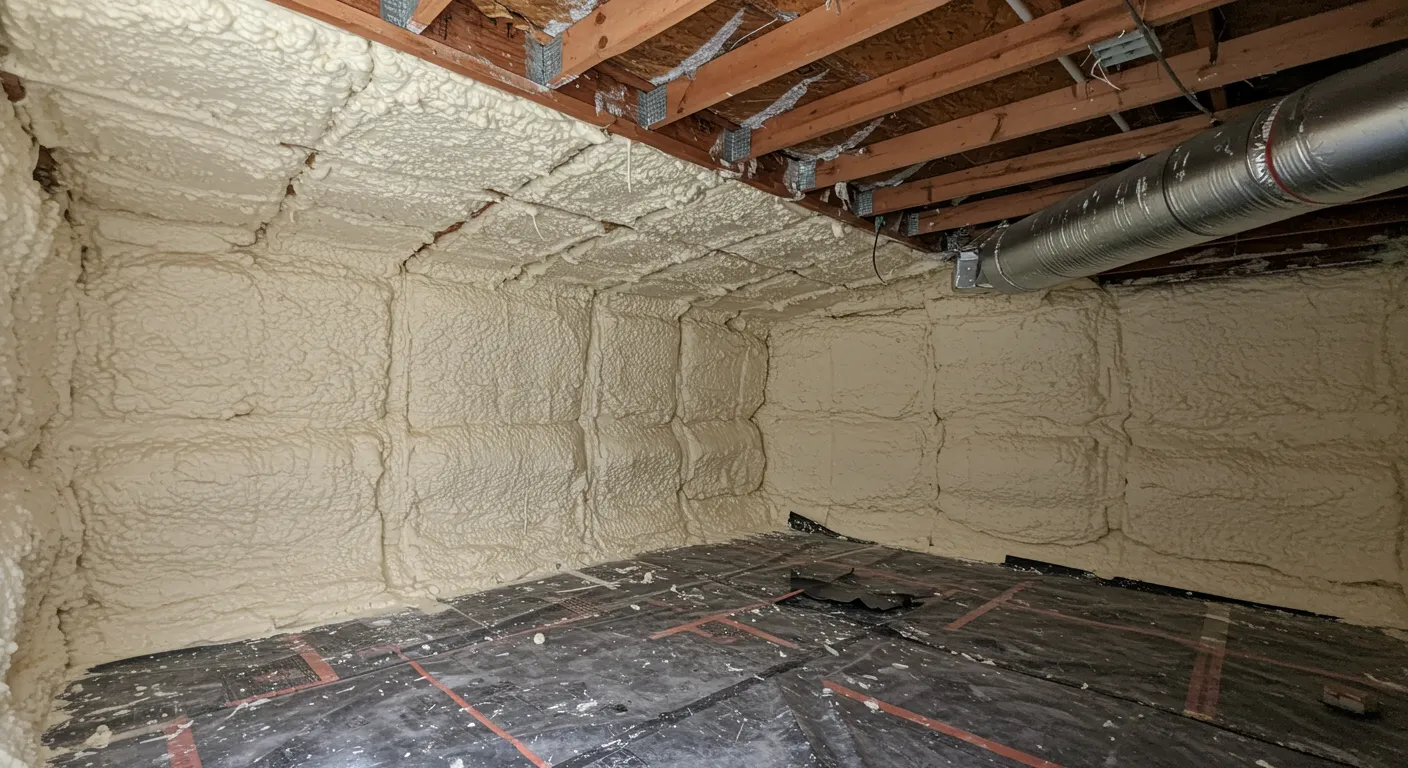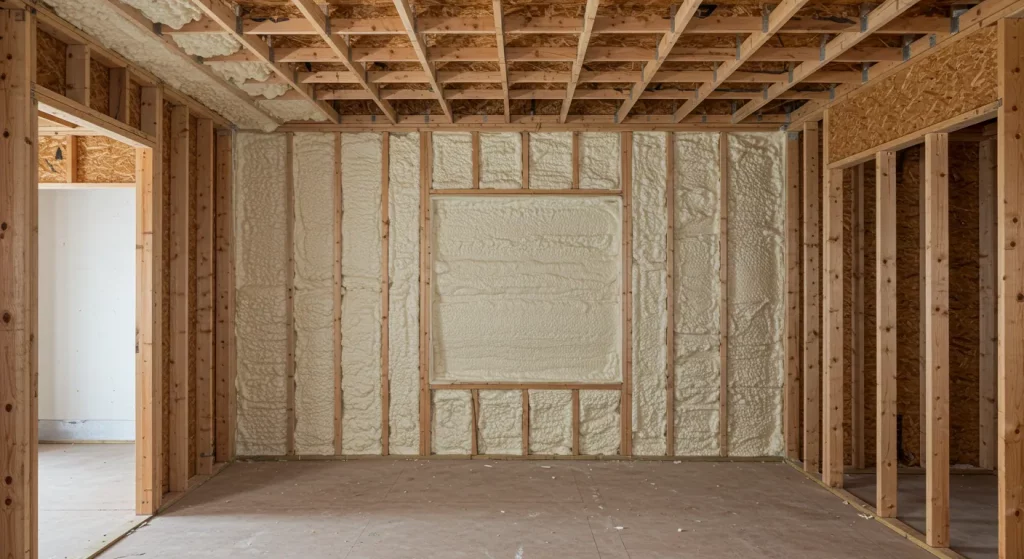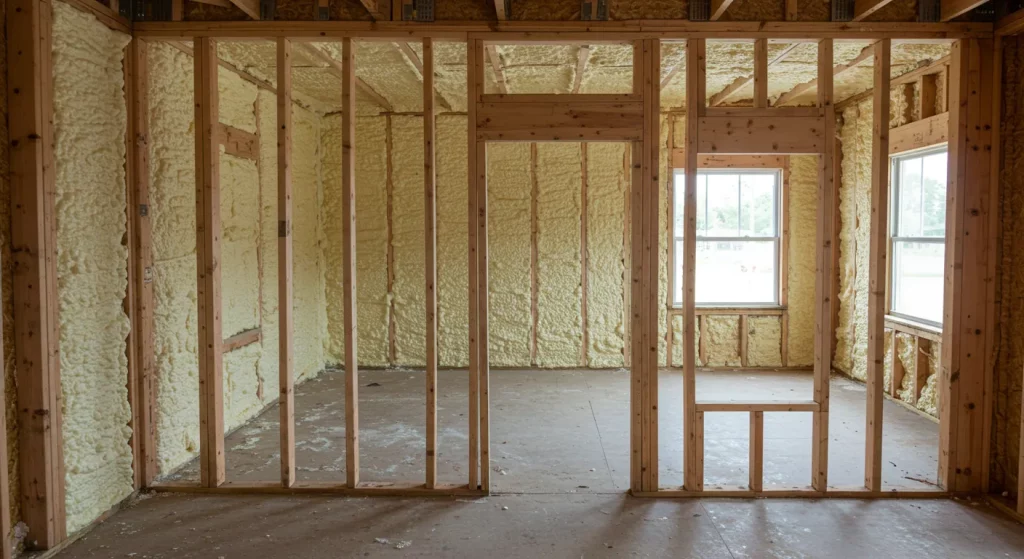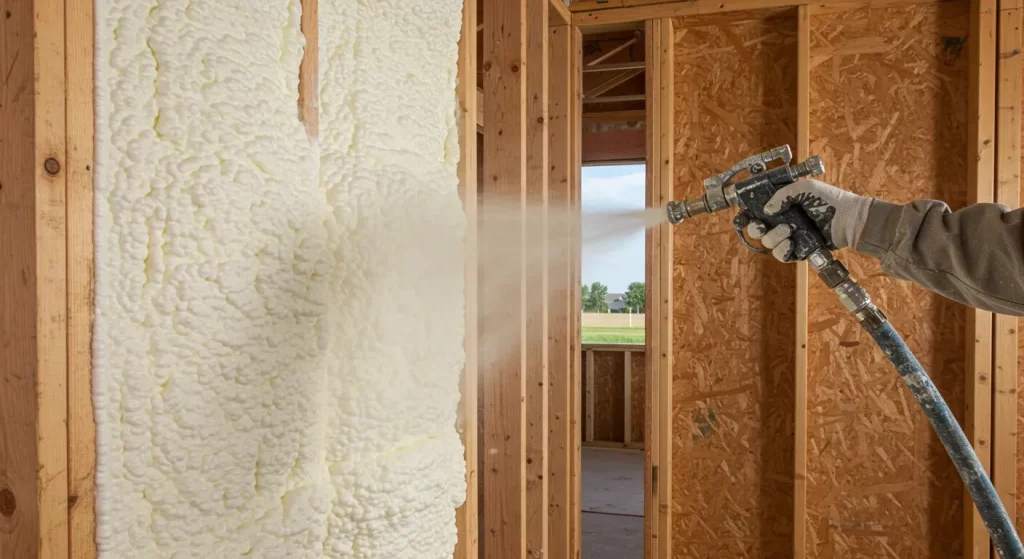It’s no secret that keeping a home comfortable in Raleigh’s unpredictable climate can be expensive. Whether it’s the heat of a humid summer afternoon or a chilly winter morning, energy bills often spike—and many homeowners don’t realize their insulation could be the reason why.
Spray foam insulation offers a smart, long-term solution. Instead of simply stuffing gaps with material, it seals and insulates in one go, helping you keep conditioned air where it belongs—inside your home. That’s how it delivers real, lasting energy savings.
What Makes Spray Foam So Energy Efficient?
What separates spray foam from fiberglass batts or blown-in cellulose is its ability to expand and completely fill gaps, cracks, and hard-to-reach places. Once it’s applied, it hardens into a dense barrier that doesn’t just slow down heat—it stops air leaks cold.
Here’s what makes spray foam such a smart choice:
- It blocks air movement, which is where most energy loss actually happens.
- It provides a high R-value per inch—especially closed-cell spray foam, which is incredibly dense.
- It resists moisture, which can quietly eat away at your home’s energy performance over time.
With spray foam, you’re not just adding insulation—you’re building a better envelope around your home.
Why Raleigh’s Climate Demands Better Insulation
Raleigh sees it all—scorching summer temps, damp spring air, and enough cold snaps in winter to make you run the heat nonstop. In a climate like this, inconsistent insulation becomes a year-round drain on your wallet.
Traditional insulation materials like fiberglass may work fine when first installed, but they tend to degrade, shift, or settle over time. Spray foam, on the other hand, bonds in place and stays put. That means your energy performance doesn’t fade as the seasons change.
And in an area with high humidity, spray foam’s moisture resistance becomes even more valuable. Less moisture means fewer issues with mold, mildew, and the kind of rot that silently drives up energy costs.
What Kind of Energy Savings Can You Expect?
When installed properly, spray foam insulation can dramatically reduce your home’s energy usage. According to energy studies, air leakage accounts for up to 40% of the energy loss in a typical home. That’s huge.
By sealing up the leaks and improving the thermal envelope of your home, you can expect:
- A 15% to 50% drop in monthly energy bills
- Better temperature control across every room
- Less frequent cycling of your heating and cooling systems
And here’s a stat worth remembering: even a one-second delay in HVAC system response caused by better insulation can translate into a measurable reduction in overall energy usage.
Where Spray Foam Makes the Biggest Impact
Not every part of your house loses energy the same way. Here’s where spray foam really goes to work:
- Attics: Since heat rises, this is one of the top places where warm air escapes in winter.
- Exterior Walls: Keeping outside air from sneaking in reduces both heating and cooling loads.
- Crawl Spaces: In homes with vented or uninsulated crawl spaces, moisture and cold air can wreak havoc.
- Garages: If attached to the home, an uninsulated garage can throw off indoor comfort levels.
By tackling these key areas, spray foam gives you a stronger, more efficient building envelope.
Bonus Benefits You’ll Notice Every Day
Saving money on your energy bills is a major win, but spray foam offers other real-world perks, too:
- Quieter Indoors: The foam helps dampen outside noise.
- Better Indoor Air Quality: Fewer leaks mean fewer allergens and pollutants coming inside.
- More Comfort: Even temperatures, no cold floors or hot upstairs bedrooms.
- Higher Home Value: Buyers are drawn to energy-efficient upgrades, and spray foam is a smart one.
In other words, your home just feels better to live in—and it’s worth more, too.
Choosing Between Open-Cell and Closed-Cell Foam
If you’re thinking about installing spray foam, you’ll need to decide which type fits your needs and budget.
- Open-cell spray foam is lightweight and more affordable. It’s great for soundproofing and interior walls.
- Closed-cell foam is denser, waterproof, and delivers a higher R-value. It’s perfect for crawl spaces, attics, and exterior walls.
Many homes around Raleigh benefit from using both in different parts of the house.
Not sure which to pick? A trained insulation professional will guide you based on your goals and your home’s layout.
Why Professional Installation Matters
Even the best insulation won’t perform well if it’s installed incorrectly. Spray foam has to be mixed and applied with care. If the ratios are off or the prep isn’t done right, you might end up with gaps, weak spots, or worse—foam that doesn’t bond properly.
Professional installation availability continues to grow, as highlighted in this recent Press Release update.
That’s why it’s essential to work with trained pros like the team at Raleigh Excel Spray Foam. We understand how Raleigh homes are built and how to insulate them the right way, using safe, efficient techniques that meet code and exceed expectations.
Table: Key Insulation Areas & Their Energy Impact
| Area of Home | Energy Benefit | Ideal Spray Foam Type |
|---|---|---|
| Attic | Stops heat escape, improves AC efficiency | Closed-cell or open-cell |
| Walls | Reduces indoor temperature swings | Open-cell |
| Crawlspace | Moisture control, warmer floors | Closed-cell |
| Garage | Better comfort, fewer indoor air leaks | Closed-cell |
Looking to Make Your Raleigh Home More Efficient?
You don’t need a complete remodel to save on energy. Small upgrades—like sealing your attic or insulating a crawl space—can create real improvements in comfort and cost.
If you’re tired of overpaying on utilities or living with inconsistent temperatures, it might be time to consider an upgrade.
Call (919) 301-9435 or reach out to our friendly team at Raleigh Excel Spray Foam for a free consultation. We’ll help you figure out where you’re losing energy and how spray foam can help you fix it for good.
Frequently Asked Questions
What’s the best insulation type for Raleigh homes?
Spray foam—especially closed-cell—offers a solid barrier against heat, air, and moisture, making it perfect for our climate.
Will this lower my energy bills right away?
Most homeowners start seeing savings within the first month. The reduction in HVAC use alone can be significant.
Does it help with humidity?
Yes, especially closed-cell foam. It forms a vapor barrier, keeping your home dry and mold-resistant.
Is it safe to use spray foam in older homes?
Absolutely. It’s often the best way to modernize your insulation without major renovations.
Can I just insulate one part of my home?
Yes. Even focusing on one problem area—like your attic or crawl space—can bring noticeable results.
Is spray foam worth the investment?
In most cases, yes. The energy savings, comfort upgrades, and durability make it a smart long-term decision.







